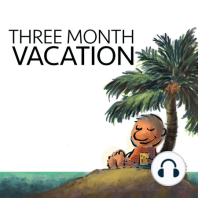16 min listen

How To Avoid Boring Testimonials (And Get 1000-1500 Word Stories Instead)
How To Avoid Boring Testimonials (And Get 1000-1500 Word Stories Instead)
ratings:
Released:
May 4, 2015
Format:
Podcast episode
Description
We ask for testimonials and we get them, but are they any good? Or are they the usual sugary stuff that no one really reads. How do you get testimonials that are "journeys" and weigh in at 800-1000 words? Find out in this episode on "how to plan—and yes—get outstanding testimonials. Oh, and I'm at sean@psychotactics.com. -------------------- Useful Resources Twitter/Facebook: seandsouza Email me at: sean@psychotactics.com Magic? Yes, magic: http://www.psychotactics.com/magic For the Headline Report (Free): http://www.psychotactics.com/ This is the Three Month Vacation. I'm Sean D'Souza. It's August 13, 2008. The time? It's 9:56 AM. Olympic champion Michael Phelps is standing behind his starting block. He bounces. He bounces lightly on his toes. Then the announcer calls his name and he steps onto the block. Michael always waves his hands thrice; he's done that since he was a kid. He then steps on the block again. He gets his position, and then the gun goes off and he jumps into the pool. The moment he's in the water he realizes something is wrong. He doesn't know what is wrong but the moisture seems to fill up the goggles. By the second turn, everything's blurry. By the third lap, his goggles are full of water. But Michael is no longer in Beijing; he's back in Michigan. The pool is a familiar practice pool, not Olympic pool. There's no roar of the crowd. It's just Bob Bowman, his coach. Bob has turned off all the lights off in the Michigan pool just so Michael can learn to swim blind, just in case something like this were to happen, something's that's happening right now at the Olympic finals. Winners always plan, and this is the difference between winners and those that struggle. The ones that struggle don't seem to have a plan in place. For something as minor as a testimonial you might think well, I don't really have to do that much planning. After all, the testimonial is about the client, isn't it? You just ask them the questions or you ask for a testimonial and they give you the testimonial. That's not true. The greatest testimonial is not some sugary-coated "I like your stuff. Your stuff is so great." The really good testimonial is a journey. It's a journey of how the customer bought your product or service, the trials and tribulations they went through, and finally, how they came out at the end. It's more like a movie than just a little Twitter feed. As you'd expect, there are three steps to get there, and we will take those itty bitty steps and we'll get there, and then we'll have our action plan, just one thing you can do, as always. What are the three things that you have to do to ensure that your testimonial is really good? This doesn't matter whether you're doing a course or you're a consultant or you have a product like a book or anything other product. You have to go through these three steps. These three steps don't work in every single instance, but in most instances you'll find that it's very, very useful. What are the three steps? Step number one is to make an appointment. What is an appointment? Let's find out. The second thing is not having examples. Why do examples matter in the first place? The third, and probably the most important, is not having the requisite questions. What are the questions? What questions do we need to ask and how do we get the answers out of the client? This is what a journey is all about. It's about planning. It's about storyboarding. It's not just about showing up for your testimonial and then hoping that the client will give you a great testimonial. We'll take this journey and we'll figure out how we get this great testimonial. When you finish this journey, go back to episode number 37. At 37 you learn the specific points where you can ask for t
Released:
May 4, 2015
Format:
Podcast episode
Titles in the series (100)
Craft Amazing Stories For Business - Part Two: Storytelling isn't an art. It's a science. Every kid knows how to tell stories. And it's cute to be a storyteller when you're a kid. But when you put structure to writing and storytelling you take it from science to art. Find out how this works with... by The Three Month Vacation Podcast